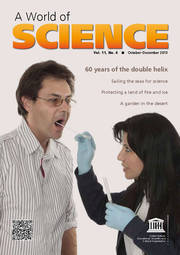Vol 2 N° 2 [April–June 2004]
CONTENTS
IN FOCUS
p 2 - Small islands step into the limelight
NEWS
p 7 - Six West African countries tackle deteriorating environment
p 8 - H.R.H. Prince Talal donates US$1 million to Solidarity Fund for Safe Water
p8 - A water action plan for Africa
p 9 - Summit recognizes researchers’ need for affordable Internet
p 9 - 150 multimedia centres for Africa
p 10 - Geologists campaign for Year of Planet Earth
p10 - Young scientists get their own Academy
INTERVIEW
p 11 - Luc Montagnier on developing a vaccine to protect infants from AIDS
HORIZONS
p 14 - After the earthquake
p 17 - Doubling the world’s water professionals
IN BRIEF
p 20 - Diary
p 20 - New releases
p 20 - Governing bodies
Quick link to Vol. 2 n° 2 (PDF document);
See also ARCHIVES for A World of Science
EDITORIAL
Small islands, big agenda
The current political crisis waging in Haiti and the civil unrest that peaked in the Solomon Islands last year are serious concerns for the Caribbean and Pacific regions. These incidents have brought home to their continental neighbours that these islands may be small but are in no way insignificant.
Haiti and the Solomon Islands are two of the world’s 41 Small Island Developing States (SIDS), an umbrella term grouping the likes of Tokelau, a territory of just 10 km2, with Papua New Guinea and its 453,000 km2. SIDS could be perceived as being an odd grouping, given that they vary greatly in size and cannot even all be labelled ‘developing states’, as Singapore and Malta demonstrate.
They may not be a homogeneous group but SIDS often face similar challenges. These include geographical isolation, small markets, limited natural resources and vulnerability to natural disasters and climate change. The very survival of some SIDS is being threatened by sea-level rise, prompting their leaders to urge that the status of ‘environmental refugee’ be recognized by international law.
The 1994 Barbados Programme of Action (BPoA) was a watershed for SIDS, the first time the island states had formally outlined specific measures in support of sustainable development. It was at this time that the islands formed the Alliance of Small Island States to make their voice heard on the world scene.
If, ten years ago, talk was very much focused on environmental concerns, it is interesting to observe a fundamental shift in discussions in the lead-up to the Mauritius meeting in August to review the BPoA. Environmental concerns have been joined by such ‘hot topics’ as security and the importance of building resilience in small islands. These topics are omnipresent in discussions today both among islanders themselves and with observer countries – generally continental neighbours or countries with strategic or financial interests in islands. Drug-trafficking, illegal trade in small arms and the disposal and transport of radioactive waste are posing real problems both for archipelagic SIDS and for those with long coastlines but inadequate resources for surveillance. Moreover, small islands are seeking to enhance their preparedness for natural disasters by reinforcing security measures concerning energy, water and food, such as through agricultural diversification and aquaculture.
The world community will be meeting in Mauritius to review implementation of the BPoA and finalize the all-important follow-up strategy beyond 2004. ‘Mauritius’ will be an opportunity for SIDS to take centre stage and reaffirm their place in the global landscape.
W. Erdelen
Assistant Director-General for Natural Sciences

